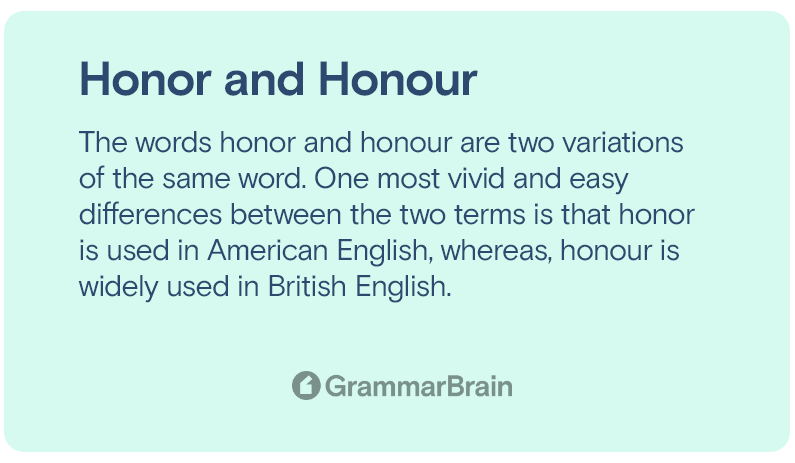Is it honor or honour? English is widely spoken across the world but it is essential to understand specific phrases, words, and sentences with proper meaning and examples. Many English words sound similar which makes it difficult for people, especially non-native English speakers to use them in everyday conversations.
Honor and honour are homophonic words that sound similar. Not only do they sound familiar, but they are also often used interchangeably. This is exactly where the confusion lies.
Incomprehensible? Don’t worry. Read the article below and understand the meaning and difference between the two terms honor and honour.

Understanding the difference between honor and honour
The words honor and honour are two variations of the same word. One most vivid and easy differences between the two terms is that honor is used in American English, whereas, honour is widely used in British English. Therefore, in simple terms, honour is the British English spelling of the same word and can be used in all similar contexts as honor.
Undoubtedly, the difference between these two terms lies not in their meaning but in the country they are used in. British English uses the ‘ou’ forms like – honour, colour, favourite, etc, whereas the American way of writing the word honor is without inserting the letter ‘u’.
However, these words often confuse people in how to use them in sentences. The next section will help you understand the two terms more clearly with some relevant examples.
| Word | Spelling |
| Honor | American English |
| Honour | British English (UK) |
Meaning of honor and honour
Honour or honor means respect or prestige. It means to hold high in esteem and show utmost regard towards someone. It further means great respect or recognition for somebody or something. It can mean to be a tangible symbol of recognition and appreciation.
Therefore, both honor and honour are correct words that mean having or showing great respect for somebody. Both have the same meaning and just different spellings.
Some examples of honor and honour
To understand clearly the meaning and difference between the two terms – honor and honour, it is imperative to go through some examples. The below-mentioned examples will clarify your doubts about how these two terms can be used in a sentence.
Examples of honor:
- Ranjan is honored to be awarded the best sportsperson for the year 2022-23.
- It is my great honor to tell you that my brother has won the Cycling Championship.
- Anita was honored to receive the singing award at the college function.
- My mother often says that she s honored to be my father’s wife.
Examples of honour:
- Jai honoured his grandmother by organising a praying ceremony for her one-year death anniversary.
- Rama was honoured to receive the best dancer award from her mother who is already a renowned dancer.
- I am honoured to be your chief guest for the award ceremony on the Annual Day.
- Khalid is extremely honoured and happy to be his friend.
You must have understood the difference between the two terms in the above examples.
Conclusion
In a nutshell, honor and honour are both alternative spellings of the same word. Both spellings are acceptable in English-speaking countries. A creative trick to remember the difference between honor and honour is that honour has a U in it which is also the starting letter for the United Kingdom. This means that honour is used in British English.
Once definitions and differences of English terms are clear, they can be used with much ease in everyday sentences.
Inside this article
Fact checked:
Content is rigorously reviewed by a team of qualified and experienced fact checkers. Fact checkers review articles for factual accuracy, relevance, and timeliness. Learn more.
Core lessons
Glossary
- Abstract Noun
- Accusative Case
- Anecdote
- Antonym
- Active Sentence
- Adverb
- Adjective
- Allegory
- Alliteration
- Adjective Clause
- Adjective Phrase
- Ampersand
- Anastrophe
- Adverbial Clause
- Appositive Phrase
- Clause
- Compound Adjective
- Complex Sentence
- Compound Words
- Compound Predicate
- Common Noun
- Comparative Adjective
- Comparative and Superlative
- Compound Noun
- Compound Subject
- Compound Sentence
- Copular Verb
- Collective Noun
- Colloquialism
- Conciseness
- Consonance
- Conditional
- Concrete Noun
- Conjunction
- Conjugation
- Conditional Sentence
- Comma Splice
- Correlative Conjunction
- Coordinating Conjunction
- Coordinate Adjective
- Cumulative Adjective
- Dative Case
- Determiner
- Declarative Sentence
- Declarative Statement
- Direct Object Pronoun
- Direct Object
- Diction
- Diphthong
- Dangling Modifier
- Demonstrative Pronoun
- Demonstrative Adjective
- Direct Characterization
- Definite Article
- Doublespeak
- False Dilemma Fallacy
- Future Perfect Progressive
- Future Simple
- Future Perfect Continuous
- Future Perfect
- First Conditional
- Irregular Adjective
- Irregular Verb
- Imperative Sentence
- Indefinite Article
- Intransitive Verb
- Introductory Phrase
- Indefinite Pronoun
- Indirect Characterization
- Interrogative Sentence
- Intensive Pronoun
- Inanimate Object
- Indefinite Tense
- Infinitive Phrase
- Interjection
- Intensifier
- Infinitive
- Indicative Mood
- Participle
- Parallelism
- Prepositional Phrase
- Past Simple Tense
- Past Continuous Tense
- Past Perfect Tense
- Past Progressive Tense
- Present Simple Tense
- Present Perfect Tense
- Personal Pronoun
- Personification
- Persuasive Writing
- Parallel Structure
- Phrasal Verb
- Predicate Adjective
- Predicate Nominative
- Phonetic Language
- Plural Noun
- Punctuation
- Punctuation Marks
- Preposition
- Preposition of Place
- Parts of Speech
- Possessive Adjective
- Possessive Determiner
- Possessive Case
- Possessive Noun
- Proper Adjective
- Proper Noun
- Present Participle
- Prefix
- Predicate



